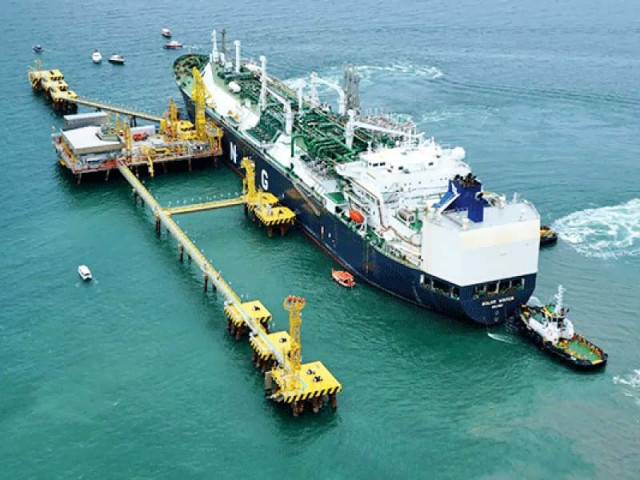OGRA grills firms seeking LNG licences
Regulator questions about contracts with suppliers, customers, capacity allocation

The Oil and Gas Regulatory Authority (Ogra) on Thursday raised a set of questions regarding documents of agreements of Energas, which is seeking a licence for sale and marketing of regasified liquefied natural gas (RLNG).
The regulator questioned about contracts with LNG suppliers, customers, capacity allocation, timeframe of imports and volume of gas.
During a public hearing, it was noted that Energas and Tabeer Energy required capacity allocation of an operational terminal for sale and marketing of LNG.
Energas and Tabeer Energy had submitted an application seeking licence for sale and marketing of LNG. The two companies are also setting up LNG terminals in Pakistan.
Tabeer Energy said that it would have the LNG handling capacity of its own terminal for sale and marketing of LNG.
However, Energas officials said that it would utilise the capacity of Pakistan LNG Limited (PLL) in April. However, PLL said that it would have terminal capacity in February and March next year.
Energas CEO Anser Khan said that they had been struggling for four years to get the LNG licence, adding that seeking approval from the government was a big challenge.
He pointed out that PLL required an LNG sale and marketing licence whereas Ogra needed a capacity allocation agreement, adding that these were the challenges they had been facing for the last four years.
Yousuf Inam, an official representing PLL, said that involvement of the private sector would bring efficiency by utilising the idle capacity. He said that Energas had participated but it was short of a marketing licence.
However, he advocated for gas utility Sui Northern Gas Pipelines Limited (SNGPL) about customers and said that PLL had some concern as customers would be repeated. He said that the company had advertised the capacity but it was unable to grant due to rising demand from the public sector.
Now, he said that they would publish an advertisement to grant capacity in February and March so that the private sector could import LNG. He said that PLL had unutilised capacity for February and March.
He also drew attention to rules that allowed the terminal operator to get pipeline capacity.
Ogra grills PLL
Ogra member gas grilled PLL for causing hurdles in the way of capacity allocation. The member gas said that public sector companies worked under the umbrella of Petroleum Division and asked to go to the government for approval of capacity allocation.
He asked PLL officials and the CEO to come to Ogra along with draft rules to settle the issue.
It was also informed during the hearing that Lucky Cement was a client of Energas for LNG supply. There were two issues causing a halt to gas supply to Lucky plant. First, there was pipeline issue where unaccounted-for-gas (UFG) losses were high and the second was gas shortage.
The member gas said that there should be competition in the supply of gas, adding that consumers would get better service and pay cheaper rates due to competition.
Rahat Kamal, an intervener, sought clarification about the allocation of capacity. He said that Energas had indicated utilising 250mmcfd of PLL capacity. Secondly, he said that PLL had signed an agreement with K-Electric for supply of 150mmcfd. Therefore, he asked how it would be feasible.
Muhammad Kashif, who was representing Pakistan GasPort Limited (PGPL), said that the PLL representative had informed they had capacity for February and March, which meant that PLL would not have any slot to offer to Energas in April.
There were several other groups which supported the grant of licence for LNG sale and marketing to Energas. Different sectors including textile backed the application. They said that the industry in Pakistan was facing issues in consistent supply of gas, especially in winter when supply to the industry was suspended.
They said that Energas should be allocated a gas sale licence on an immediate basis so that they could supply gas to the industry.
Lucky Motor Corporation said gas-fired power and industrial machinery/equipment was more economical and user-friendly with respect to operation and environment. It said that the government could achieve good numbers with respect to exports on account of a low production cost.
Sindh Petroleum and CNG Dealers Association said that the compressed natural gas (CNG) sector faced an irreversible damage during shutdowns in the last winter.
Meanwhile, Ogra conducted a public hearing in response to a petition filed by Tabeer Energy, a subsidiary of Mitsubishi in Pakistan.
Chief Marketing Officer Shigeki Terada, representing Mitsubishi, said they had an integrated plan for uninterrupted supply of LNG to different sectors, especially CNG and power.
He said that it would give an option to customers and pledged to contribute to Pakistan’s economy by materialising the plan of setting up an LNG terminal and ensuring supplies.
Yasir Mukhtar, team leader of Tabeer Energy, said that Mitsubishi had a portfolio of operations and developing projects in the global market.
He said that the LNG project would be the first fully integrated in Pakistan. It will be 100% private terminal that would reduce financial burden on the government.
He added that it would give a choice to the consumers. The terminal will be a Floating Storage and Regasification Unit (FSRU) and will handle 20 cargoes per year. “We are targeting to make it operational in the first quarter of 2023,” he added.
He said that the company had an MoU with the world-class FSRU provider. It also signed an MoU with SNGPL and had an understanding with Sui Southern Gas Company (SSGC) to operate in the gas sector.
Answering questions posed by Ogra representatives, Tabeer Energy Marketing (Private) Limited (TEMPL) General Manager Jawad Majeed explained that the terminal would be commissioned and be ready for first gas supply by the first half of 2023.
As TEMPL will be the first fully integrated terminal where LNG import, regasification and sales would be handled by the company itself, there will be massive savings for the government as no offtake guarantees will be taken.
Responding to a question about the terminal capacity available to third parties, Majeed said that for TEMPL first priority would be given to its own customers while if spare capacity was available it could be made available as per third-party access (TPA) rules.



















COMMENTS
Comments are moderated and generally will be posted if they are on-topic and not abusive.
For more information, please see our Comments FAQ